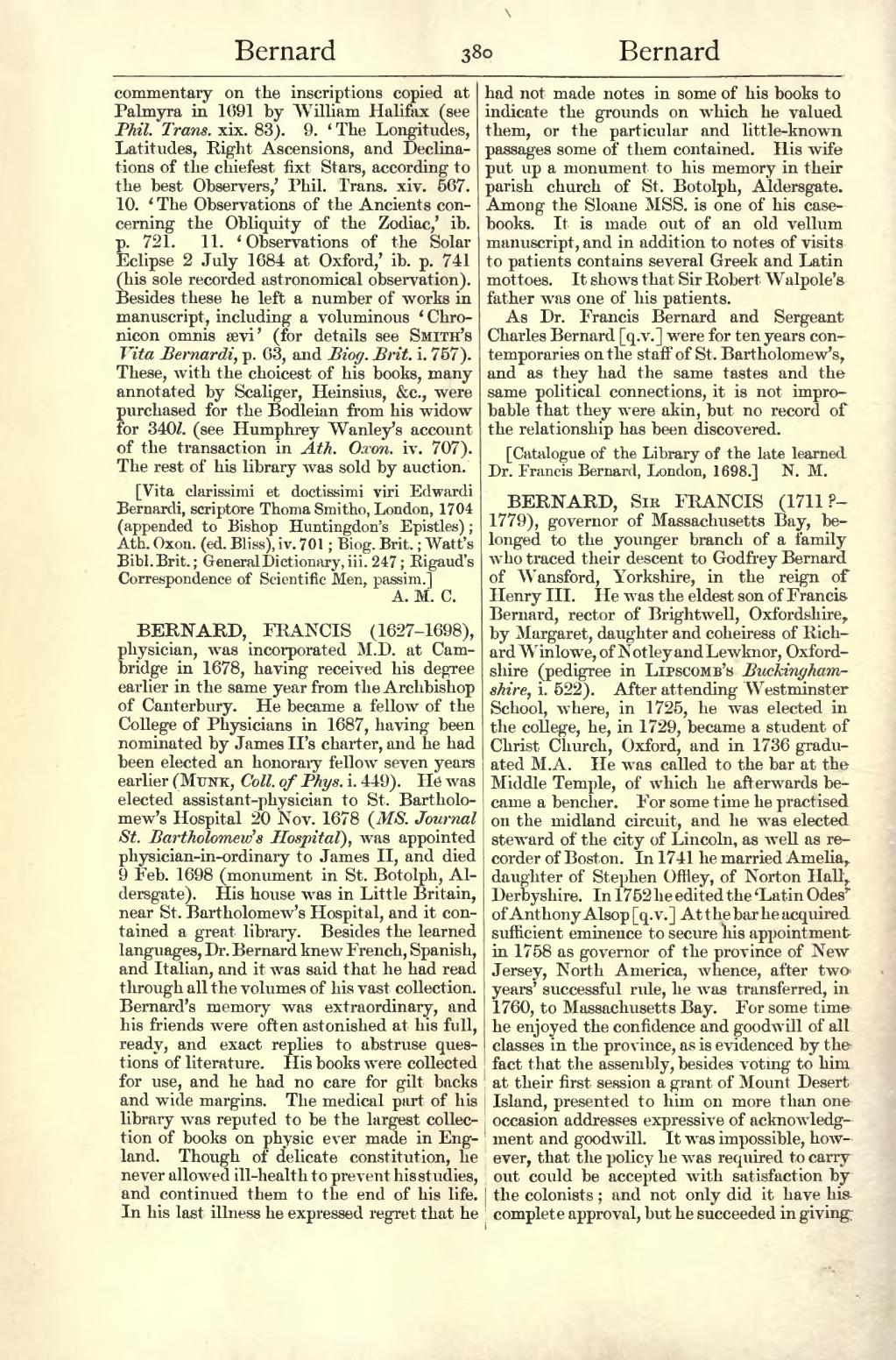commentary on the inscriptions copied at Palmyra in 1691 by William Halifax (see Phil. Trans, xix. 83). 9. 'The Longitudes, Latitudes, Right Ascensions, and Declinations of the chiefest fixt Stars, according to the best Observers,' Phil. Trans, xiv. 567. 10. 'The Observations of the Ancients concerning the Obliquity of the Zodiac,' ib. p. 721. 11. 'Observations of the Solar Eclipse 2 July 1684 at Oxford,' ib. p. 741 (his sole recorded astronomical observation).
Besides these he left a number of works in manuscript, including a voluminous 'Chronicon omnis ævi' (for details see Smith's Vita Bernardi, p. 63, and Biog. Brit. i. 767). These, with the choicest of his books, many annotated by Scaliger, Heinsius, &c., were purchased for the Bodleian from his widow for 340l. (see Humphrey Wanley's account of the transaction in Ath. Oxon. iv. 707). The rest of his library was sold by auction.
[Vita clarissimi et doctissimi viri Edwardi Bernardi, scriptore Thoma Smitho, London, 1704 (appended to Bishop Huntingdon's Epistles); Ath. Oxon. (ed. Bliss), iv. 701; Biog. Brit.; Watt's Bibl. Brit.; General Dictionary, iii. 247; Rigaud's Correspondence of Scientific Men, passim.]
BERNARD, FRANCIS (1627–1698), physician, was incorporated M.D. at Cambridge in 1678, having received his degree earlier in the same year from the Archbishop of Canterbury. He became a fellow of the College of Physicians in 1687, having been nominated by James II's charter, and he had been elected an honorary fellow seven years earlier (Munk, Coll. of Phys. i. 449). He was elected assistant-physician to St. Bartholomew's Hospital 20 Nov. 1678 (MS. Journal St. Bartholomew's Hospital), was appointed physician-in-ordinary to James II, and died 9 Feb. 1698 (monument in St. Botolph, Aldersgate). His house was in Little Britain, near St. Bartholomew's Hospital, and it contained a great library. Besides the learned languages, Dr. Bernard knew French, Spanish, and Italian, and it was said that he had read through all the volumes of his vast collection. Bernard's memory was extraordinary, and his friends were often astonished at his full, ready, and exact replies to abstruse questions of literature. His books were collected for use, and he had no care for gilt backs and wide margins. The medical part of his library was reputed to be the largest collection of books on physic ever made in England. Though of delicate constitution, he never allowed ill-health to prevent his studies, and continued them to the end of his life. In his last illness he expressed regret that he had not made notes in some of his books to indicate the grounds on which he valued them, or the particular and little-known passages some of them contained. His wife put up a monument to his memory in their parish church of St. Botolph, Aldersgate. Among the Sloane MSS. is one of his casebooks. It is made out of an old vellum manuscript, and in addition to notes of visits to patients contains several Greek and Latin mottoes. It shows that Sir Robert Walpole's father was one of his patients.
As Dr. Francis Bernard and Sergeant Charles Bernard [q. v.] were for ten years contemporaries on the staff of St. Bartholomew's, and as they had the same tastes and the same political connections, it is not improbable that they were akin, but no record of the relationship has been discovered.
[Catalogue of the Library of the late learned Dr. Francis Bernard, London, 1698.]
BERNARD, Sir FRANCIS (1711?–1779), governor of Massachusetts Bay, belonged to the younger branch of a family who traced their descent to Godfrey Bernard of Wansford, Yorkshire, in the reign of Henry III. He was the eldest son of Francis Bernard, rector of Brightwell, Oxfordshire by Margaret, daughter and coheiress of Richard Winlowe, of Notley and Lewknor, Oxfordshire (pedigree in Lipscombe's Buckinghamshire, i. 522). After attending Westminster School, where, in 1725, he was elected in the college, he, in 1729, became a student of Christ Church, Oxford, and in 1736 graduated M.A. He was called to the bar at the Middle Temple, of which he afterwards became a bencher. For some time he practised on the midland circuit, and he was elected steward of the city of Lincoln, as well as recorder of Boston. In 1741 he married Amelia, daughter of Stephen Offley, of Norton Hall, Derbyshire. In 1752 he edited the 'Latin Odes' of Anthony Alsop [q. v.] At the bar he acquired sufficient eminence to secure his appointment in 1758 as governor of the province of New Jersey, North America, whence, after two years successful rule, he was transferred, in 1760, to Massachusetts Bay. For some time he enjoyed the confidence and goodwill of all classes in the province, as is evidenced by the fact that the assembly, besides voting to him at their first session a grant of Mount Desert Island, presented to him on more than one occasion addresses expressive of acknowledgment and goodwill. It was impossible, however, that the policy he was required to carry out could be accepted with satisfaction by
the colonists; and not only did it have his complete approval, but he succeeded in giving
